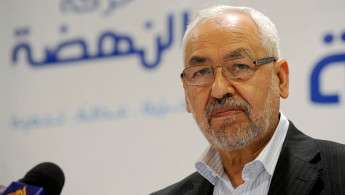Tunisia's opposition leader, 82, launches hunger strike
The jailed leader of Tunisian opposition party Ennahda, 82-year-old Rached Ghannouchi, launched a hunger strike on Monday, his Islamist-inspired party said.
In prison since last April, Ghannouchi "decided to start a hunger strike... in solidarity" with fellow prisoners who are also rejecting food, Ennahda said in a statement.
The strike aims "to support all the political opponents in the different prisons" in Tunisia, it added.
Ghannouchi is the best-known opposition figure imprisoned in Tunisia since President Kais Saied dismissed parliament and seized all state power in July 2021.
Ennahda had dominated Tunisian politics since the 2011 revolt that toppled the dictatorship of Zine El Abidine Ben Ali and launched the region's Arab Spring revolts.
Ghannouchi was sentenced earlier this month to three years in prison on charges of receiving illegal "foreign" funding for his organisation.
He had already been sentenced last May to one year in prison on terrorism-related charges, a sentence that was increased to 15 months on an appeal in October.
That verdict was handed down following a police union complaint decrying Ghannouchi's comments in early 2022 during an Ennahda official's funeral.
Ghannouchi had said at the time that he "fears neither the powerful nor the tyrants", referring to police, according to the prosecution file.
Tunisia's democratic facade: One step closer to autocratic rule 👇
— The New Arab (@The_NewArab) December 24, 2022
✍ @AlessandraBajec https://t.co/H8CZEGaHu4
More than 20 opposition politicians, businessmen and other figures denounced by Saied as "terrorists" have been imprisoned over the past year.
Several jailed opposition figures, including Jawhar Ben Mbarek and Issam Chebbi from the National Salvation Front, Tunisia's main opposition coalition, have been on hunger strike for eight days to demand their release.
The jailed politicians also led a hunger strike for several days in September, against what they called "baseless, arbitrary prosecutions" and an attempt to sideline the opposition.
The majority of imprisoned opposition figures stand accused of "conspiracy against state security".





 Follow the Middle East's top stories in English at The New Arab on Google News
Follow the Middle East's top stories in English at The New Arab on Google News
![The UAE is widely suspected of arming the RSF militia [Getty]](/sites/default/files/styles/image_330x185/public/2024-11/GettyImages-472529908.jpg?h=69f2b9d0&itok=Yauw3YTG)
![Netanyahu furiously denounced the ICC [Getty]](/sites/default/files/styles/image_330x185/public/2024-11/GettyImages-2169352575.jpg?h=199d8c1f&itok=-vRiruf5)
![Both Hamas and the Palestinian Authority welcomed the ICC arrest warrants [Getty]](/sites/default/files/styles/image_330x185/public/2024-11/GettyImages-2178351173.jpg?h=199d8c1f&itok=TV858iVg)